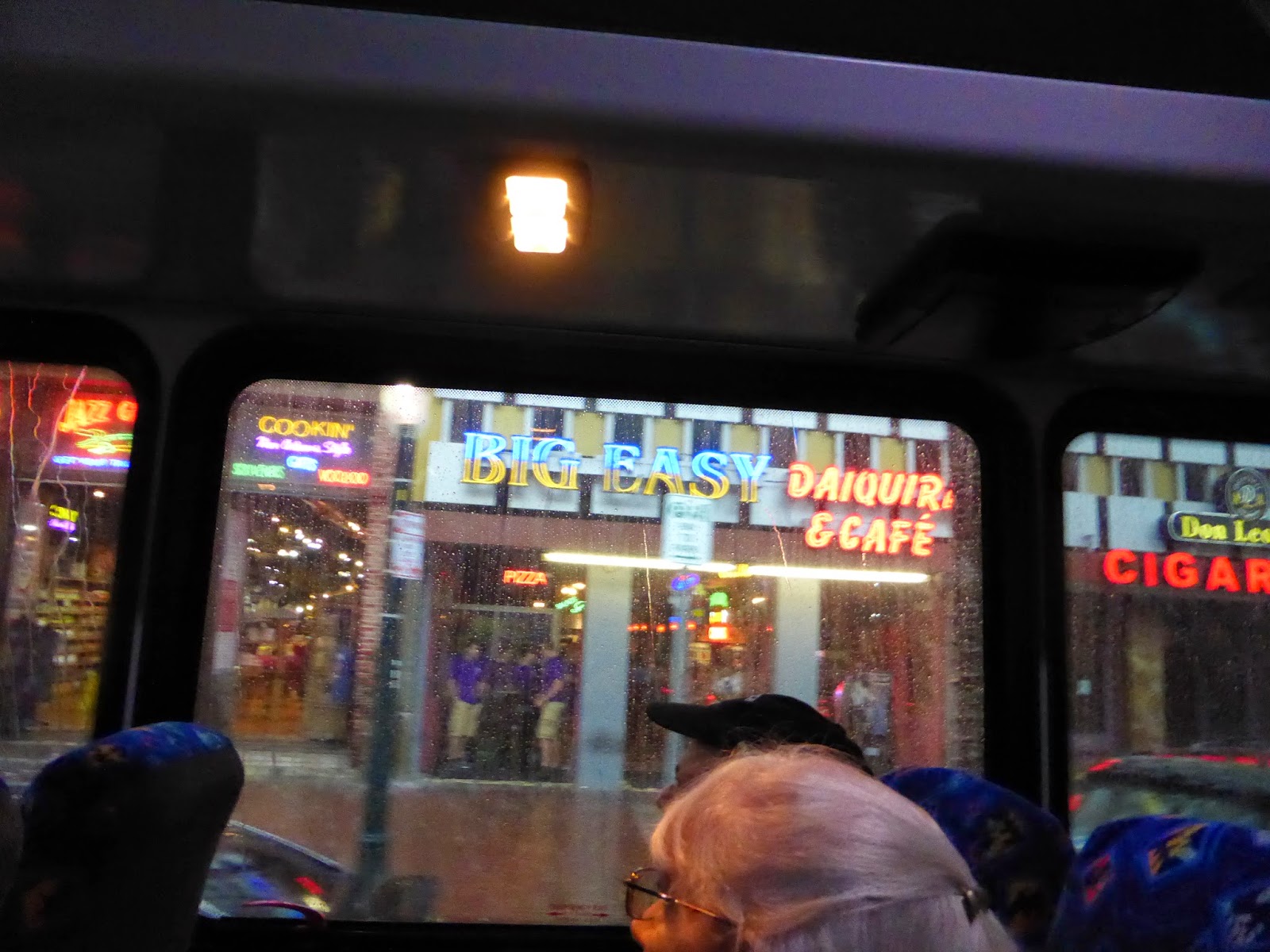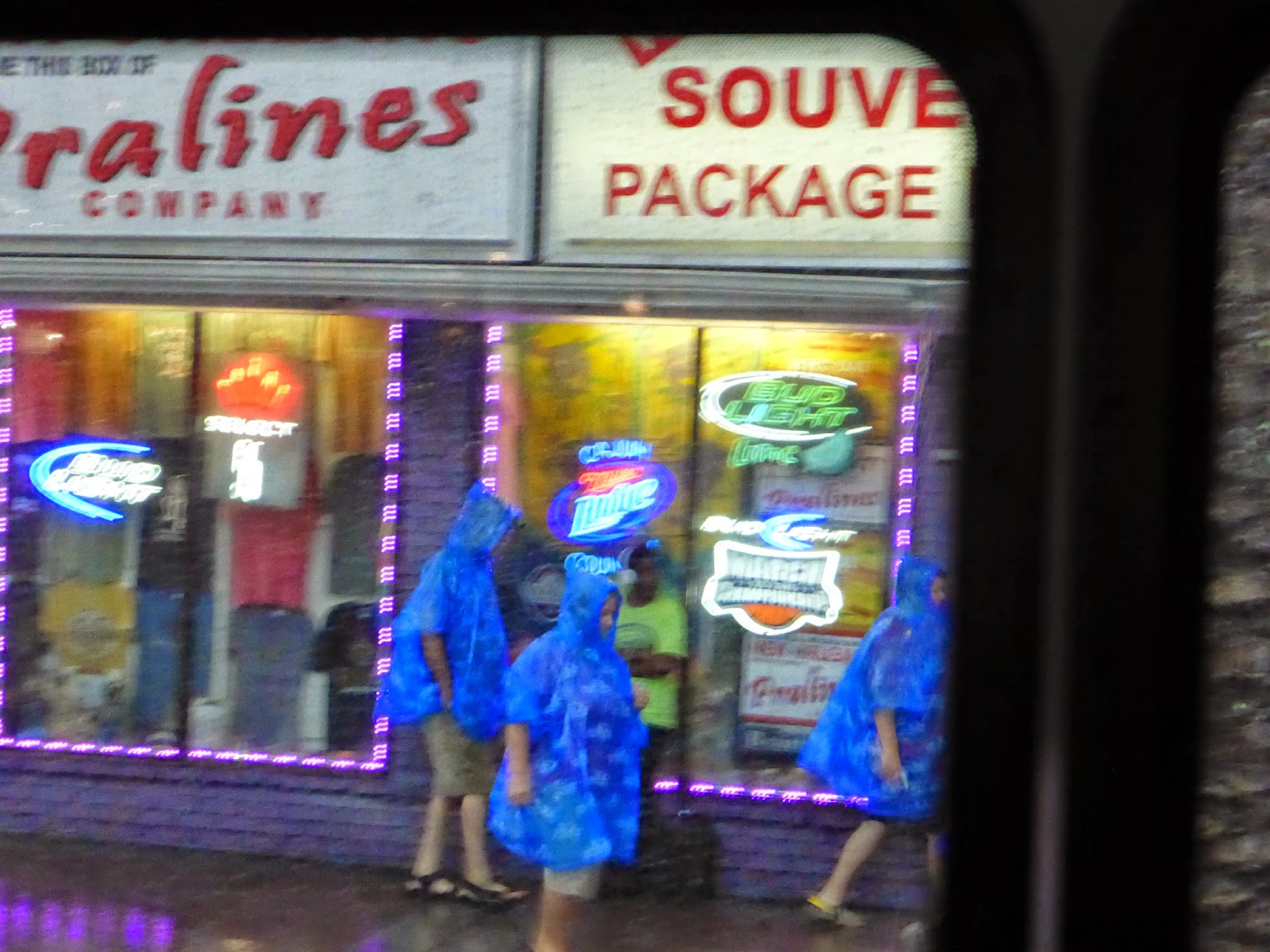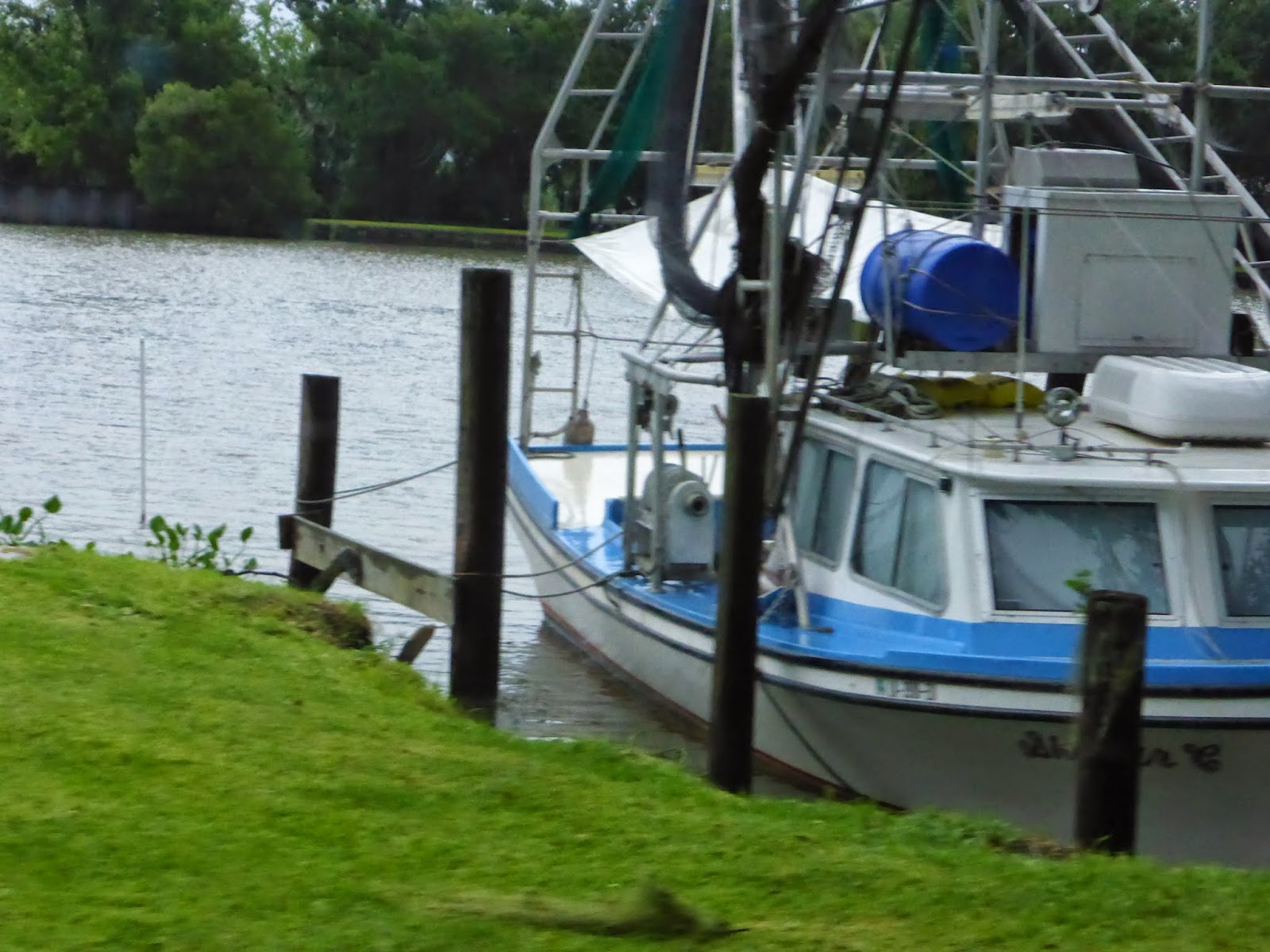Picked up by a limousine bus, the ride took us through the city, over a bridge across the Mississippi then out through the suburbs, for about forty minutes. Air-con., chatty passengers, the bus driver stopped at a dollar store so we could purchase rain ponchos and snacks.
Droplets of rain water on the bus windows made for some atmospheric effects. We drove over the Mississippi River and way away on a freeway, then into the outer suburbs, and soon, into the swamp.
The busload of us were then in a whole other place, hurtling along a narrow road barely wide enough for two cars. One side rich green land, where people live in houses up on bricks and some on high piles. The other side watery, consisting of man-made canals and swampland.
Many locals make their living fishing and hunting there, some live from that. The tour business is part of the local economy. A choice of fast air-boat, which is exciting but a wetter experience than the more sedate, barge-like riverboat under cover.
Captivated, we eventually travelled along the canals, surrounded by dense swamp growth and those broad waterways, lush vegetation and wide, rather eerily smooth water.
The canals stretch from the Gulf of Mexico, to Florida. The water is brackish, a mixture of salt and fresh, at times more salty than others. Sometimes there's no salt in it at all. So various kinds of fish are caught there, both fresh and seawater fish.
Many creatures live in the swamp and canals. Fish jumped trying to escape the bigger fish, below, who were after them. Many human beings can identify with that dire situation, perhaps. Except in our case, those who think themselves more powerful set themselves higher than others, (possibly warm blooded predators require rarefied air for their illusions to work properly)?
A white Great Egret, member of the crane family, appeared to pose in some shallows, a one and a half metre high, stark pale bird against green trees and grasses. Its long sleek head gaspingly lovely and somewhat rock 'n' roll, the beak yellow, and long (for fishing). Flying to stand on a log, it next took flight across the backdrop of trees when we'd stopped a while. The enormous wings powerful, fanned well open and taking this creature far from us, quickly.
A Blue Heron also noticed, it stood extremely still in shallow water, (despite our peering at it from the nearby halted boat), as if imitating a reed. Its plumage variegated, camouflaging. Then it too flew off so we saw its beautiful wings open and carry the bird away, along then up, out of sight.
 |
| Airboat |
 |
| Barge, one of two held there by a tugboat, which we later saw pushing them along someplace. |
Orangeish dragonflies hovered everywhere, their warm colour obvious against pale Spanish moss cascading from intensely green trees, and alligators swam in fast when they heard the boat. We saw countless reptiles in the water. One was lifted by its tail a moment, too, by our captain; he grabbed a three or so metre long alligator. It thrashed about in the air, trying to get free and easily did so in seconds. Much splashing from the alligator, and many gasps from passengers.
The captain called the alligators co-workers.
I'm still not sure it's a good idea to bother these beasts by picking them up, but fascination with them at the time over-rode such concerns, then. I had not expected such closeness, to be eyeballing an alligator, many of them in fact.
 |
| Yes, it's an oil well. The natural gas is being burnt off, and oil is pumped into tanks. |
 |
| They call to collect the oil every few weeks. I cannot begin to describe how helpless this made me feel, out in the swamp, everywhere beauty, then this. |
A local cemetery by the water had graves above ground, white sepulchre, some with elaborate statuary. If the bodies are placed above ground in tombs then it's less likely they will float out in floods. One friend of the Captain's, however, had to bury his grandmother three times. "He always thought she'd come back and haunt him." The Captain's own grandmother is also buried there.
We all sat in sombre fashion regarding the cemetery. Most of this tour was not sobering however, there were various surprises and a great deal of humour.
 |
| First alligator sighted - it looks like a dark stick by that bottom railing |
 |
| Large alligator swimming towards the boat - there were many of them at this point |
 |
 |
| Open mouth of an alligator there by the captain's shoulder. They can jump half their length out of the water, too, so he was in danger doing this to feed them by hand. |
 |
| Add caption |
Now, here's some tips and descriptions you could find useful when the captain says, "Let me introduce you to a friend of mine. His name is Elvis."
Unable to take my eyes off the creature only a half a metre from me, I dimly heard the captain say we could hold him, and hurriedly put my camera away.
"You ready, Chef?" Captain Reggie has a humorous manner, and nicknames appear as easily as the water flows by us in the many man-made canals that lead to the swamp. He handed Elvis gently to me.
First, carefully take the alligator from the captain of your tour boat, who has just produced the animal from a cupboard where it's been in an aquarium. Follow instructions. Hold an alligator just under the chin and under the bottom of its tail.
The young alligator lay there in my hands, about a third of a metre, maybe a half a metre long. The skin underneath a dark cream with faint dark lines, on top it is greenish and brownish, textured, and attractive, even smart. An alligator close-up is a beautiful beast.
The eyes with their slit pupils appear alert, and the alligator seems to smile. He already has a few tiny teeth, we're told.
I took the alligator and held it a while. My blinking in amazement didn't seem to faze the animal; it looked proud of itself. A pulse under its chin against my hand.
Everyone on board except for maybe one or two held the alligator. A French girl posed with it on her shoulder. Capt. Reggie held Elvis's tail from the back, and the alligator sat along her arm in front. Photographs were taken in a storm of clicks.
When Elvis the alligator gets bigger he will be released back into the water. They are the size of a thumb when born, and not many of them survive to grow as big as Elvis. But alligator farms have increased their numbers, enormously.
An Alligator Whisperer - there's proof on youtube - Capt., Reggie feeds them gigantic marshmallows - www.youtube.com/watch?v=NWFEYNkSFg4
"They like anything pale. Alligators will go for something white and eat it. So when we throw people overboard, we choose the palest. Or we get those people wearing lots of white." His voice dead-pan, but he grinned, quite the showman.
A wondrous calm and good humour came over me there in the deep swamp, as if our gliding along smoothed away all my distress, anything at all rough, or disturbing, gone.
Beautiful green trees slipped by us hung with trailing, grey Spanish moss - something to do with the serenity, but also, I love sitting on a boat. Reminded of my father, younger I often sailed out on his boat, which he built with my grandfather - ours being a cabin cruiser, however, not a long, river tour boat. It calmed me to think of those days. A decent memory being what it is, the best hours surfaced, the most pleasant water journeys. So many times I drove the boat towards home with everyone feeling tired but happy. Dad took the wheel later, as we neared the channel and harbour.
Rain pattered down in the Louisiana swamp, (or is it Mississippi when we are over the river)? anyway, a few drops fell now and then. Circular ripples textured the somewhat calm water's surface, but soon the skies cleared to only a few clouds.
Reptiles both repulse and attract people, they're a cold-blooded creature and difficult to charm or identify with, but quite beautiful, nevertheless, and a miracle like everything on this planet. To have explored the swamp and seen these alligators in their usual habitat gave me a sense of nature being so much more powerful than anything human beings may do. The humbling aspects of such excursions surely level us, give a sense of perspective, encourage people to be as kind to nature as we may be.
I hope many people take my example and buy trees for travel, for instance. Purchase trees for places that need them, like Australia, Borneo, and so on. Trees and people are symbiotic. Trees produce oxygen so we may breathe.
Support natural places by creating as little waste as possible too please, and disposing of any you do have, correctly. On these travels I tend to go buy snacks at a fruit and vegetable place, if I can find one, for instance, with my own bag. It'd be a breakthrough if more tours offered wasteless snacks, and some kind of wilderness support donation system. That instead of offering the heads of alligators for sale, for example. Taxidermy an art surely, but the inert trophy heads of beautiful animals are nowhere near as attractive as a creature alive and swimming out there in the green wilderness. I'd love to think some money I spent created an opportunity for the swamps to stay healthy and beautiful, rather than my simply supporting alligator farming, and trophy creation.
*
I'm missing home now and looking forward to the new term at uni., but glad to have visited New Orleans. I've been from West to East, San Francisco, Seattle, Iowa, Chicago and New York, then flying to Los Angeles and home to NZ, the last time, just over two years ago. That was a visit to meet writers I'd only ever known online, for twelve years. This trip in 2014 also to see some of those writers and friends, while paying back to New Orleans which gave me so much music as a youngster. North to South in this amrkn land of extraordinary differences, San Francisco, Seattle, Iowa, Memphis, Lake Charles, Houston, and finally New Orleans. And there are here too many variations to ever see in what's remaining of my lifetime.
But I wish I'd seen more of my friends when I was here. This trip it seems we've become accustomed to each other, and knowing as we do how we each like our solitude perhaps that's meant we've not connected as closely as last time, some of us. Also, one has moved away, and some were too far to visit in the three short weeks I was allowed, this being a break from uni lecturing.
I must thank all of the people I met up with again, however, and say how good it was to see them once more, probably for the last time unless they pop over to Aotearoa New Zealand, one day.
Nothing is ever the same in any case, every day begins anew no matter where we may find ourselves. Ample time to face big questions for myself, I guess. Long distance travel provides many hours of obvious change. A person may often most easily discover more about what's closest, most important, and valuable long-term, in some strange fashion, because we're forced to think about what truly matters in contrast with all the new places, sights, smells, tastes and people, and so on all about us.
Tomorrow, a city tour, to see the worst of what Katrina did, amongst other things. The New Orleans cemetery we visit too, I gather, also taking in New Orleans as a whole, over four hours.
Then the next day I fly home, to winter, and lecturing work once more, then also to see my family and friends in Aotearoa New Zealand, on the edge of the world, a collection of islands. Not this vast continent which fascinates me so. This enormous place, amrka, it helps me to put my life into a perspective I may more easily live with, I think, gives me a framework I can work within realistically, or something like that. Many hours spent here thinking over various aspects of existence, in any case, and all the stories and poems I've yet to write are crowding inside me, like a host of visitors ready to be made welcome, and to show themselves, somehow.
Thanks for reading and please do comment. I appreciate your kind attention.













































No comments:
Post a Comment